|
The Invisible Jewish Budapest
Metropolitan Culture at the Fin de Siècle
Mary Gluck
The George L. Mosse Series in Modern European Cultural and Intellectual History
Steven E. Aschheim, Skye Doney, Mary Louise Roberts, and David J. Sorkin, Series Editors
“A profoundly insightful analysis.”
—Times Literary Supplement
Budapest at the fin de siècle was famed and emulated for its cosmopolitan urban culture and nightlife. It was also the second-largest Jewish city in Europe. Mary Gluck delves into the popular culture of Budapest’s coffee houses, music halls, and humor magazines to uncover the enormous influence of assimilated Jews in creating modernist Budapest between 1867 and 1914. She explores the paradox of Budapest in this era: because much of the Jewish population embraced and promoted a secular, metropolitan culture, their influence as Jews was both profound and invisible.
 Mary Gluck
is a professor of history and Judaic studies at Brown University. She is the author of Georg Lukács and His Generation, 1900–1918 and Popular Bohemia: Modernism and Urban Culture in Nineteenth-Century Paris.
Mary Gluck
is a professor of history and Judaic studies at Brown University. She is the author of Georg Lukács and His Generation, 1900–1918 and Popular Bohemia: Modernism and Urban Culture in Nineteenth-Century Paris.
Praise
“Remarkable historical detective work has brought this book to life. . . . Beautifully written.”
—Journal of Modern History
“The Invisible Jewish Budapest has a truly bold vision that is expressed in subtle, poignant analyses of the many cultural layers of turn of the century Budapest. . . . Mary Gluck’s retrieval, indeed her illumination of this lost cultural world is so powerful exactly because it leaves room for its darker side. She has descended into the underbelly of the golden age of Hungarian Jewry and emerged with a diamond.”
—Hungarian Historical Review
“This book does not disappoint. On the contrary, Gluck has produced a true tour de force, seamlessly wedding together the most engaging aspects of Hungarian Jewish history, cultural, and urban life.”
—Hungarian Studies Review
“In this fascinating, well-documented history of short-lived Jewish Budapest, Mary Gluck presents the questions of modernity and of Jewish identity as the central dynamics of this culture. . . . Both scholarly and entertaining.”
—Jewish Currents
“A series of imaginative and captivating essays. . . . Gluck insightfully explores how the popular culture and commercial entertainment of metropolitan Budapest invented new forms of Jewish sociability and self-identity and made Jewish difference visible.”
—Austrian History Yearbook
“A magnificently consequential book. Gluck examines the vibrant modernist culture created largely by secular Jews in Budapest, in counterpoint to a backward-looking, nationalistic Hungarian establishment and a conservative Jewish religious elite”
—Scott Spector, author of Violent Sensations: Sex, Crime, and Utopia in Vienna and Berlin, 1860–1914
“Gluck’s argument is so brilliant, perceptive, and clear that one can forget what a radical challenge it is to received opinion.”
—Steven Beller, author of Rethinking Vienna 1900
|

Larger images
New in Paperback!
August 2019
LC: 2015036814 DS
272 pp. 6 x 9
40 b/w illus.
|

